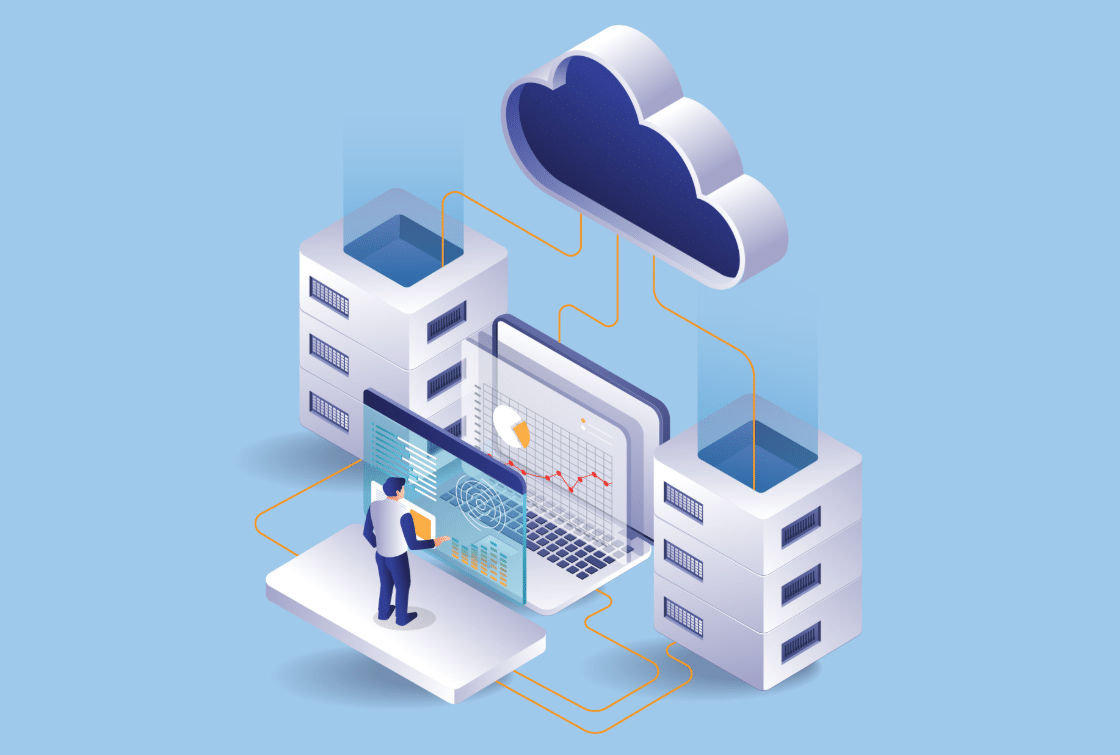On Cloud Server – As businesses and organizations worldwide strive to improve efficiency, reduce costs, and innovate faster, cloud computing has emerged as a game-changer. Among the many offerings in the cloud space, cloud servers have become an essential component for building scalable, flexible, and cost-effective IT infrastructures. This shift from traditional on-premise servers to cloud-based solutions has transformed how we think about computing, data storage, and application deployment.
In this article, we will explore the concept of cloud servers, their key benefits, how they work, the various types of cloud server configurations, and the role they play in powering modern digital enterprises.

What Is a Cloud Server?
A cloud server is a virtualized server that runs on a cloud computing platform, offering on-demand computing power and storage over the internet. Unlike traditional physical servers, which are housed in data centers and require significant upfront investments in hardware, cloud servers allow businesses to rent server space and resources on a pay-as-you-go basis. This model eliminates the need for managing physical hardware and provides greater flexibility and scalability.
Cloud servers are hosted in remote data centers operated by cloud service providers such as Amazon Web Services (AWS), Microsoft Azure, and Google Cloud Platform (GCP). These servers can be quickly provisioned, customized, and scaled based on the needs of the organization, all without the need for physical hardware management.
How Do Cloud Servers Work?
Cloud servers work by using virtualization technology, which allows multiple virtual servers to run on a single physical server. This is done through hypervisor software, which enables the efficient partitioning of resources like CPU, RAM, and storage. Cloud providers maintain large server farms that are distributed across multiple geographic locations, ensuring high availability, fault tolerance, and low-latency access.
Virtualization and Hypervisors
-
Virtualization: The process of creating virtual (rather than physical) versions of resources, such as servers, storage devices, or networks. Virtualization enables efficient resource allocation, scalability, and flexibility.
-
Hypervisor: A piece of software that manages virtual machines (VMs) by allocating physical resources and ensuring the separation of VMs.
When you request a cloud server, the provider provisions a virtual machine from their available pool of resources. The cloud server behaves like a dedicated physical server but operates within a virtualized environment, giving users the ability to manage and configure it as needed.
Key Features of Cloud Servers
1. Scalability
One of the defining features of cloud servers is their scalability. Businesses no longer need to worry about running out of capacity as they can quickly scale up or down based on demand. Whether you’re dealing with a sudden surge in traffic, or scaling down during off-peak times, cloud servers provide unmatched flexibility.
-
Elastic Scaling: Cloud servers can automatically adjust their resources to accommodate fluctuations in traffic or workload.
-
Resource Allocation: Businesses can allocate specific resources like CPU, RAM, and storage to meet application needs without the overhead of physical hardware.
2. Cost Efficiency
Unlike traditional on-premise infrastructure, which involves high upfront costs for hardware and maintenance, cloud servers operate on a pay-as-you-go model. This means businesses only pay for the resources they consume. With no need to buy or maintain physical hardware, companies can focus their resources on growth and innovation.
-
No Initial Capital Investment: No upfront cost for purchasing servers or maintaining physical hardware.
-
Flexible Billing Models: Pay only for what you use, with options for long-term commitments (e.g., reserved instances) that offer further discounts.
3. High Availability
Cloud providers offer redundant systems to ensure high availability. By distributing data and workloads across multiple physical servers and locations, cloud servers can handle failovers without significant downtime.
-
Disaster Recovery: Cloud servers are backed up and replicated across data centers, ensuring continuity in case of hardware failure or outages.
-
Load Balancing: Cloud servers use load balancing to distribute workloads evenly across multiple servers, improving system performance and reliability.
4. Security
While security is a concern for any cloud solution, cloud providers invest heavily in state-of-the-art security protocols to ensure the protection of data. Cloud servers come equipped with built-in security measures like data encryption, firewalls, and multi-factor authentication (MFA).
-
Encryption: Data is encrypted both at rest and in transit, making it more secure than traditional on-premise servers.
-
Compliance: Leading cloud providers adhere to global security standards and regulations, such as GDPR, HIPAA, and ISO 27001, making it easier for businesses in regulated industries to comply.
5. Managed Services
Many cloud service providers offer managed services that take the burden of server maintenance and management off the customer’s shoulders. This includes automatic software updates, security patching, and monitoring of system health.
-
Monitoring Tools: Cloud servers come with integrated monitoring tools (e.g., AWS CloudWatch, Azure Monitor) to track performance and resource utilization.
-
Automated Backups: Cloud servers can be automatically backed up on a regular schedule, ensuring data protection.
Types of Cloud Servers
There are several types of cloud server configurations, each designed to cater to specific needs and use cases:
1. Virtual Private Servers (VPS)
A Virtual Private Server (VPS) is a virtual machine allocated a specific portion of a physical server’s resources. It provides a balance of affordability and performance, making it ideal for small to medium-sized businesses that require a more isolated environment than shared hosting but don’t need the full resources of a dedicated server.
2. Dedicated Cloud Servers
A dedicated cloud server is a single virtual server that has access to the entire physical machine’s resources. It is ideal for businesses that need high performance and resources dedicated solely to their applications. Dedicated cloud servers provide greater control, security, and customization compared to shared environments.
3. Managed Cloud Servers
Managed cloud servers are cloud servers that come with additional management services, such as software updates, security patching, and system monitoring. This is an ideal choice for businesses that want the benefits of cloud servers but lack the expertise to manage them.
4. Serverless Computing
Serverless computing allows developers to run code without worrying about server management. The cloud provider automatically handles the infrastructure, scaling, and resource allocation. Serverless platforms, such as AWS Lambda or Azure Functions, are ideal for event-driven applications, microservices, and APIs.
Benefits of Using Cloud Servers
1. Flexibility and Customization
Cloud servers provide the ability to customize your infrastructure based on your needs. You can select the operating system, storage type, CPU capacity, and network configuration, ensuring the environment is optimized for your specific workloads.
2. Global Access
Cloud servers can be accessed from anywhere in the world. This global access enables remote work, collaboration, and the ability to serve customers in different geographical regions with low latency.
3. Automatic Updates and Patching
With cloud servers, software and security updates are managed by the cloud provider. This reduces the administrative burden on businesses and ensures that systems are always up to date with the latest security patches.
4. Environmental Sustainability
Many cloud providers are committed to sustainability by using renewable energy sources to power their data centers. This reduces the environmental footprint of businesses, as they no longer need to maintain energy-consuming physical servers.
Use Cases of Cloud Servers
Cloud servers are used in a wide range of industries and applications. Here are a few key use cases:
1. Web Hosting and E-Commerce
Cloud servers are an excellent choice for hosting websites, blogs, and e-commerce platforms. With the ability to scale resources dynamically based on demand, cloud hosting ensures that your website can handle traffic spikes without compromising performance.
2. Software Development and Testing
Developers use cloud servers to build and test applications in isolated environments. Cloud servers offer the flexibility to provision development and testing environments quickly, ensuring faster time-to-market for new products and updates.
3. Big Data and Analytics
Cloud servers are perfect for handling large-scale data processing and analytics. With integrated services like BigQuery (Google Cloud), Azure Synapse Analytics, and AWS Redshift, businesses can store and process massive datasets to derive actionable insights in real time.
4. Disaster Recovery and Backup Solutions
Cloud servers offer a cost-effective solution for disaster recovery (DR) and data backups. By replicating critical workloads to the cloud, businesses can ensure that their data is protected and readily available in the event of an emergency.
5. Machine Learning and Artificial Intelligence
Machine learning models require substantial computing power to train and deploy. Cloud servers provide the necessary resources to run these compute-intensive tasks without the need for costly infrastructure investments.
Conclusion
Cloud servers are reshaping the IT landscape by offering businesses a scalable, cost-effective, and secure alternative to traditional on-premise servers. With their flexibility, global accessibility, and advanced features like automatic scaling and security, cloud servers empower organizations to innovate, grow, and stay competitive in an increasingly digital world.
Whether you’re hosting a website, running machine learning algorithms, or building a disaster recovery plan, cloud servers provide the foundation for your digital transformation. As cloud technology continues to evolve, businesses can expect even more powerful, automated, and integrated solutions that further enhance their ability to leverage the cloud to meet their goals.
